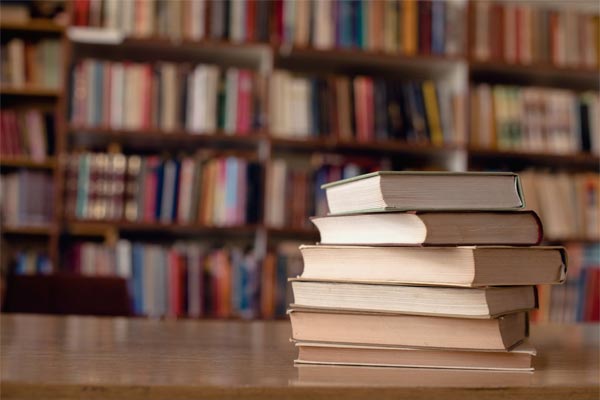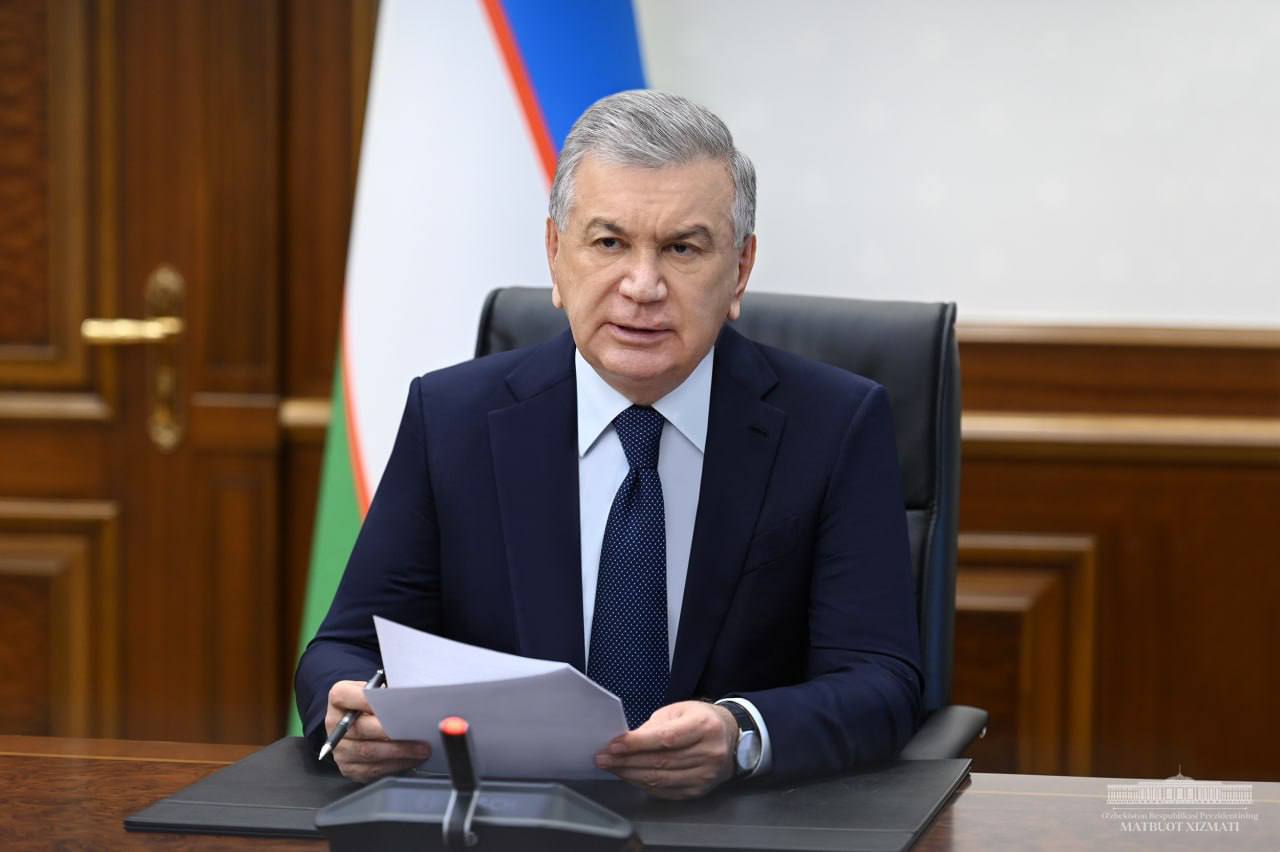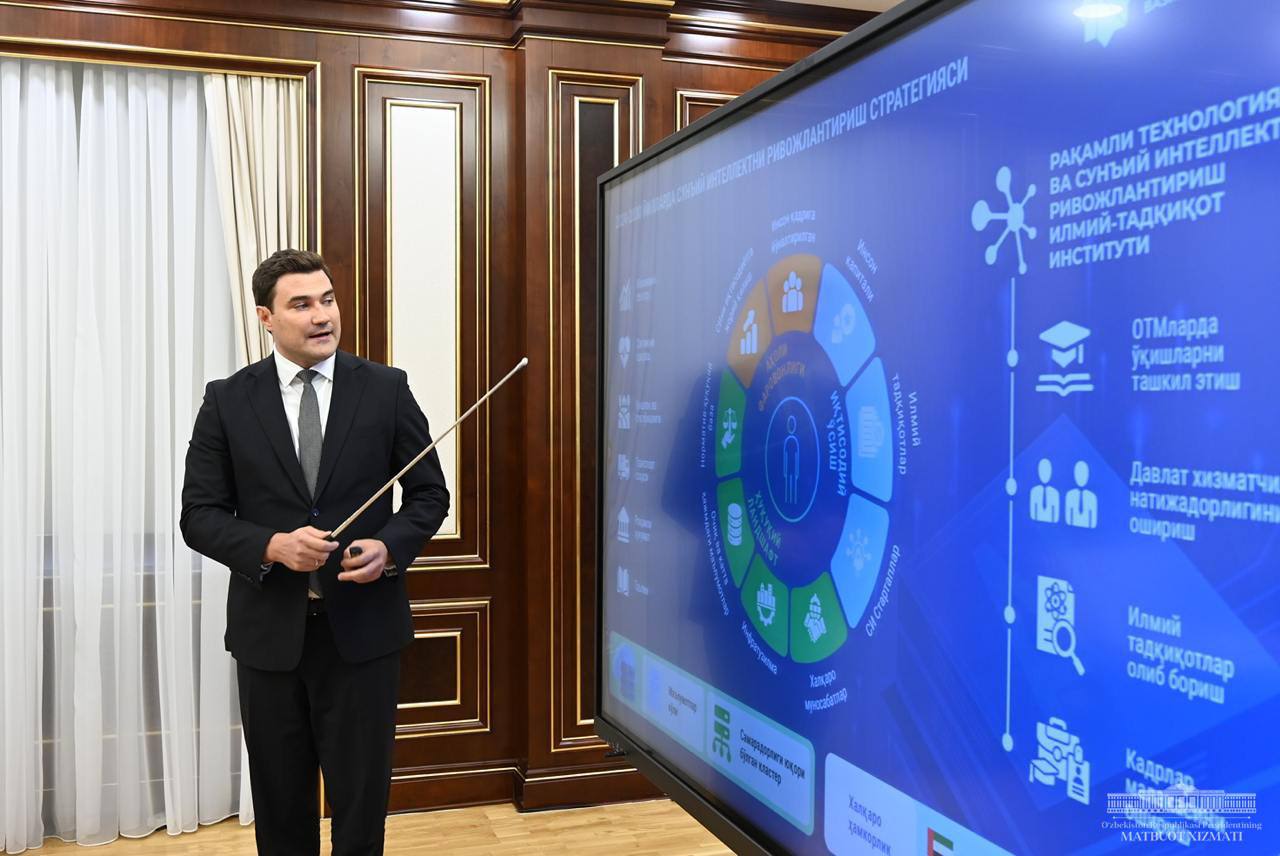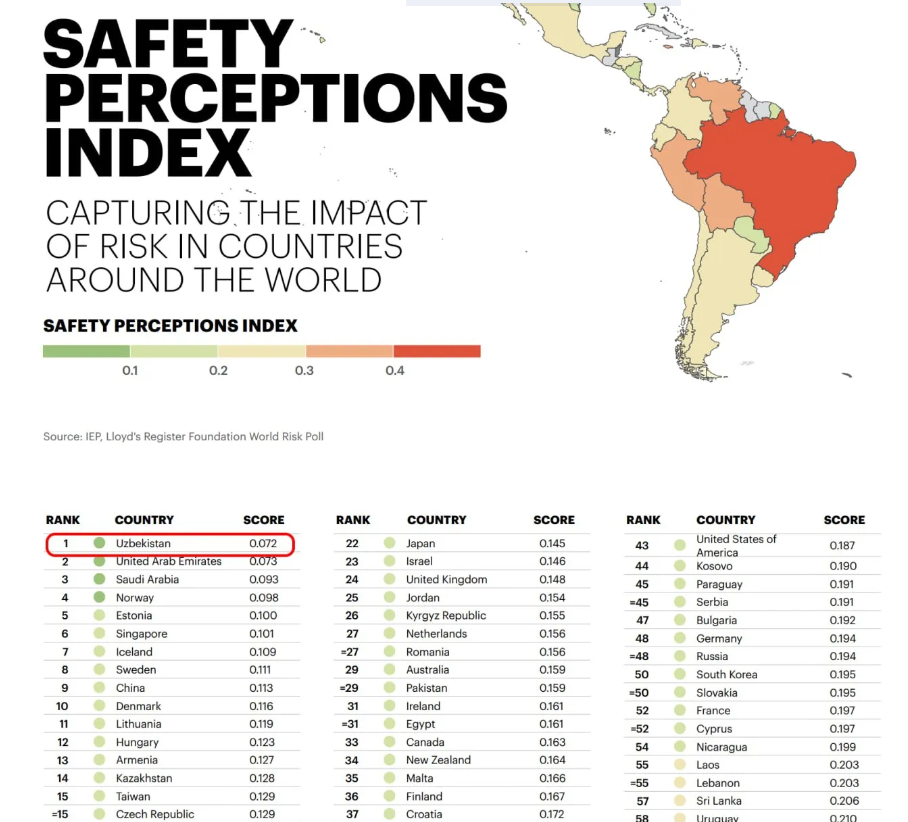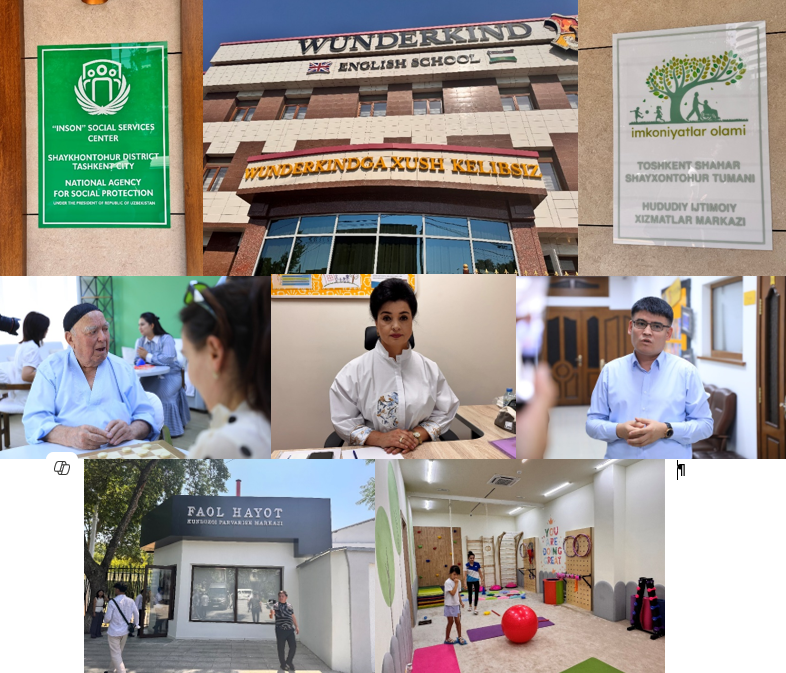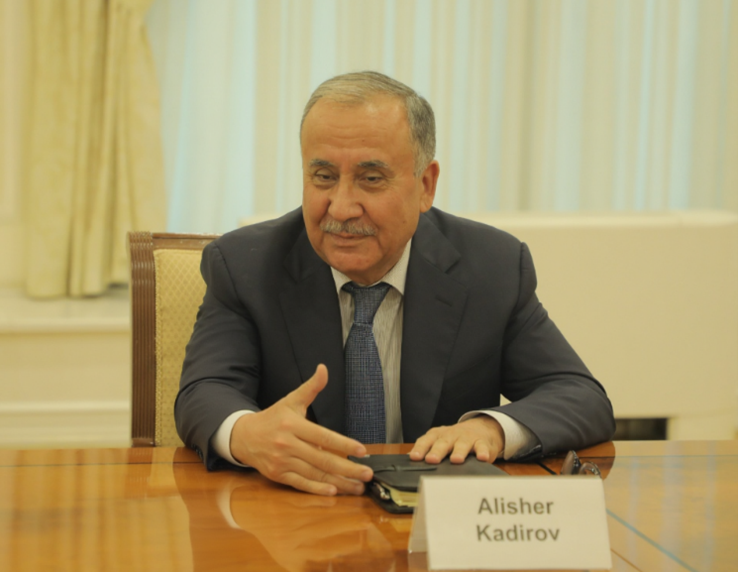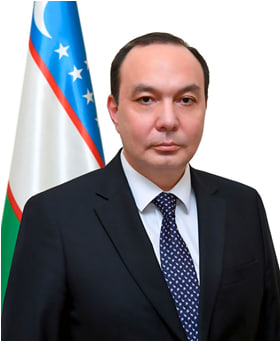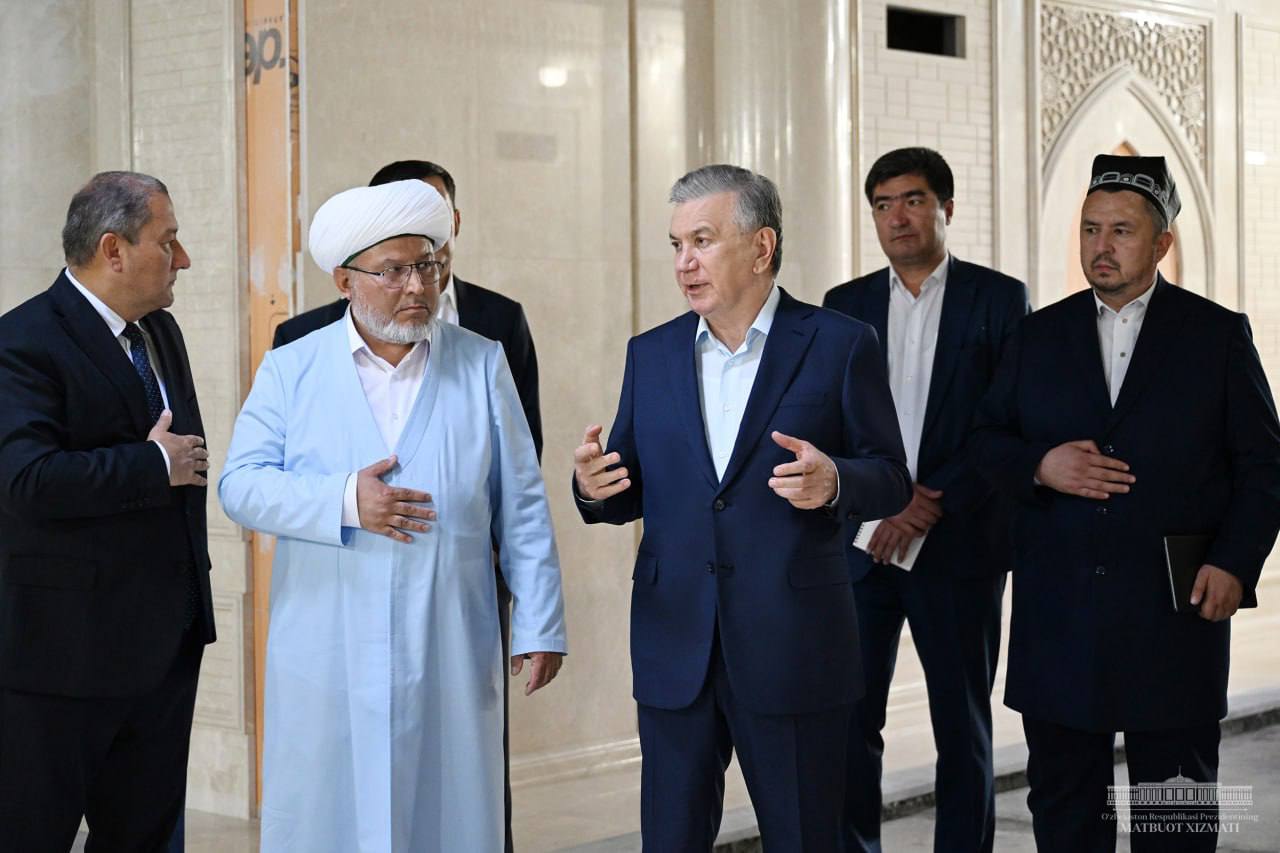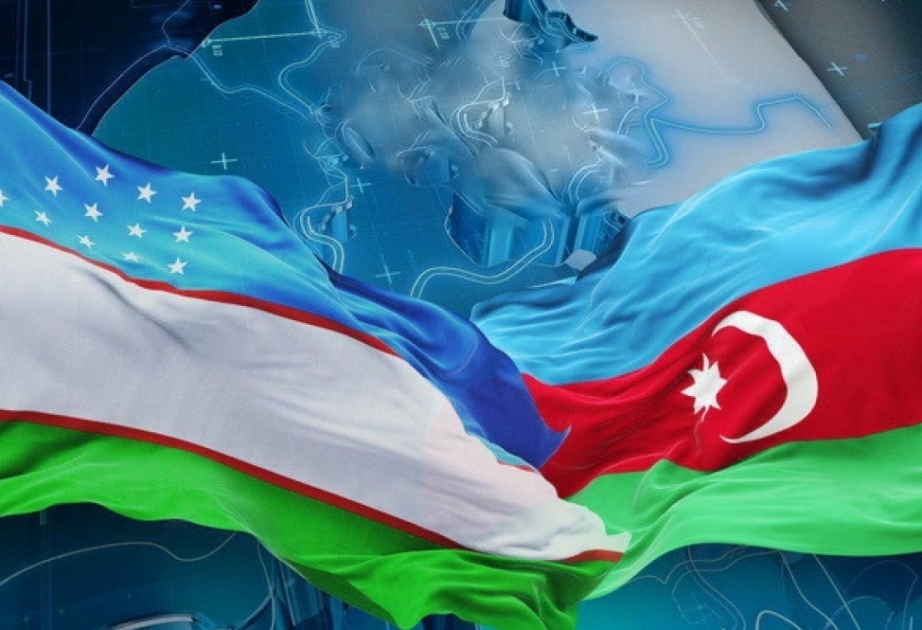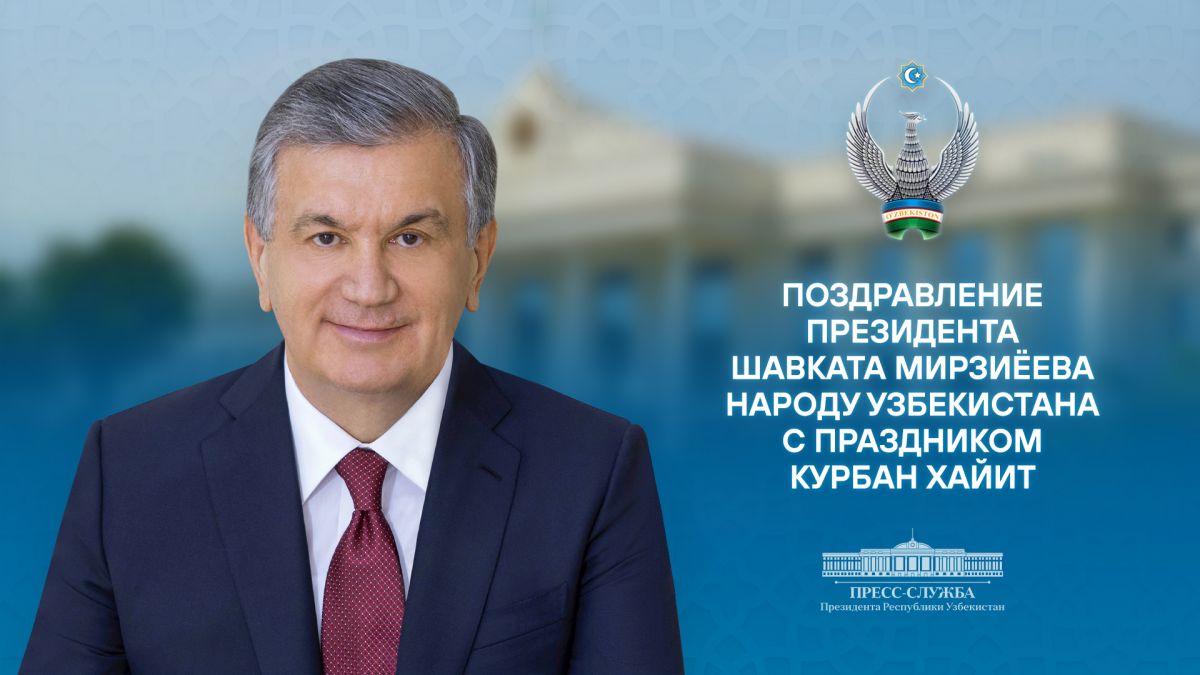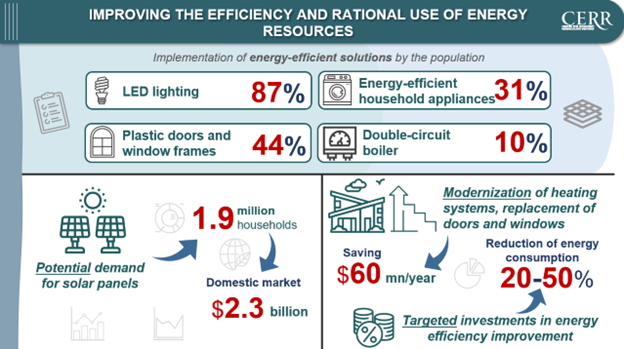Phone
Consular Issues
Phone
Uzbekistan news
We recommend
Uzbekistan: a focus on promoting reading
📅 24.06.2024
Libraries play a key role in education, culture, and community development, providing an invaluable resource for accessing knowledge, preserving cultural heritage, and promoting intellectual growth. In the modern information society, they remain an important institution that promotes the education and self-development of people of all ages.
President Shavkat Mirziyoyev emphasised during the opening ceremony of the People's Library under the President of the Republic of Turkey in Ankara: “Intellectual potential, high morale is what makes a nation strong. The source of this invincible power is books and libraries – the great invention of mankind”.
At the present stage, education has become one of the most important areas of state policy. The government of the Republic of Uzbekistan pays special attention to the development of this sphere, recognizing its key role in the prosperity of the country. In recent years, the republic has achieved significant success in the educational domain. These achievements are aimed at modernizing the system, improving the quality of education and training, and expanding access to education for all citizens of the country.
At the same time, special attention is paid to the promotion of reading and the fostering of the reading culture of the population. And in the Presidential Decree adopted on September 13, 2017, “On the program of comprehensive measures to develop the system of publishing and distributing book products, improving the culture of reading”, clear goals are outlined for the creation of an effective system of information and library services to the population, which served to move this area to a new stage of development and contributed to raising the level of social and information culture and the role of libraries, made it possible to develop and implement modern innovative and educational technologies that increase the competitiveness of Uzbekistan in the world market.
In addition, the Presidential Decree “On further improvement of information and library services for the population of the Republic of Uzbekistan” was adopted on June 7, 2019. The main goals of the decree are:
- improving the regulatory framework in order to ensure high-quality social guarantees to the population for information and library services;
- development of information and library institutions taking into account modern requirements;
- promoting the sustainable development of information and library services the for population in the regions;
- strengthening the material and technical base of information and library institutions;
- development of public-private partnerships in the library sector, a network of private and electronic libraries;
- expanding cooperation with Internet resources that specialize in distributing electronic books to improve the efficiency of libraries and the efficiency of servicing (including paid) users;
- ensuring the safety of information and library institutions and the safety of information and library collections as part of the national and world cultural heritage;
- formation and enhancement of the information culture of society, sustainable interest in national history and culture, enhancement and promotion of a reading culture;
- staffing information and library institutions with qualified specialists.
The adoption of this decree expands the range of services in the country, including access to electronic resources and holding cultural and educational events, as well as improving staff qualifications and introducing modern methods of user service. In addition, these changes not only contribute to the development of the information society and economic growth by attracting investment in education and culture, but also promote the formation of a literate and informed society, which is an important step in the development of the country.
The Resolution of the Cabinet of Ministers dated December 14, 2020 approved the National Program for the Development and Support of a Reading Culture for 2020-2025, which includes the publication of quality books that meet the spiritual, educational, artistic and aesthetic needs of the population; supporting the activities of publishers and artists, publishing children's literature; translation of the best examples of national and world literature; simplification of the organization of book sales; improving the delivery system for newly published books and distribution of information sources; expansion of international cooperation in the field of online ordering of foreign work, their delivery and distribution.
In turn, it should be noted that within the framework of the “Uzbekistan - 2030” Strategy, special attention is paid to the popularization of masterpieces of Uzbek and world literature. The country's leadership strives to instil in citizens a love of reading and ensure access to libraries and information services for everyone.
The Strategy “Uzbekistan - 2030” puts forward such main goals as increasing the number of young book lovers to five million, the annual creation of 100 works of art and 50 books for children and adolescents, the publication of the multi-volume book “Uzbek adabiyoti khazinasidan” (“From the Treasury of Uzbek Literature”), the 100-volume book “Jakhon Bolalar Adabiyoti Durdonalari” (“Pearls of World Children’s Literature”) in Uzbek, as well as the digitalization of a book fund of almost 40 million books.
On November 28, 2023, there was signed the Presidential Decree “On measures to implement the project “A Thousand Books for Youth”, aimed at creating a system for translating books popular in the world into Uzbek, that contribute to increasing the intellectual and scientific potential of the younger generation.
At the same time, within the framework of the “Olympiad of Five Initiatives”, the following 5 projects in the field of reading and intellectual games are annually implemented: “Young Reading Family”, “Poetry Competition”, “Young Reader”, the intellectual game “Zakovat” and the project “Example of Foreign Languages”. These projects increase the interest of young people in reading books and help expand logical thinking and knowledge through intellectual games.
The “Young Reader” and “Young Reading Family” competitions are important events held to promote reading, the spiritual enrichment of youth, and increase their intellectual potential. This competition serves to increase interest in books among young people and expand their knowledge and horizons.
Also, within the framework of the project “A Thousand Books for Youth”, the Agency for Youth Affairs will have to work on acquiring rights to use works from authors, translating them into Uzbek, and preparing for printing and publishing books on the basis of a state order and at the expense of the State budget (with the exception of books, published for state higher educational institutions).
Two stages have been established for translation into Uzbek and the publication of popular books in the world. First: a preliminary list of books is formed annually by the Expert Council. Second: the preliminary list is posted in the information systems of the Agency for Youth Affairs for selection by the population by voting, and thus the final list is formed.
The list of books published annually must include at least 20 percent of popular science works. The rights to the works prepared for publication will belong to the Agency for Youth Affairs, which will provide them free of charge to publishing houses.
It is also planned to create and ensure the continuous operation of a special mobile application that accumulates literature in the Uzbek language and provides the population with free access to a wide range of information. On the recommendation of the Expert Council, the works will be distributed to information and library institutions (including libraries of public and administration authorities), and electronic versions will be donated free of charge to the Alisher Navoi National Library of Uzbekistan and the relevant institutions of the Academy of Sciences of the Republic of Uzbekistan for wide use by readers.
The necessary spiritual, legal, material, and technical basis has been created in the Republic to develop children's literature and improve the quality of textbooks and teaching aids. The country's publishing houses have increased the publication of works by authors of world and Uzbek children's literature. In accordance with a number of documents adopted to promote book reading, systematic measures are being taken in all regions to popularise literature among children and adolescents. Over the past four years, a number of presidential decrees and government resolutions have been adopted to guide the country's publishing, printing, and bibliographical information institutions.
Thus, bibliographical information services play a critical role in ensuring public well-being by providing citizens with easy access to information, knowledge, and culture. In addition, the development of digital services, collaboration with communities, and the use of new technologies strengthen the role of libraries as centres of learning, information, and communication. This helps to enhance the capabilities of people and stimulates their desire for education. The development of the potential of information and library services contributes to lifelong learning, self-improvement, cultural and spiritual enrichment of the population. This is of crucial importance for modern society.
Ramzidin Nuridinov
Expert of the Development Strategy Center.
Information on plans in automotive industry presented
📅 26.11.2024
President Shavkat Mirziyoyev was reported the current work and plans for 2025 in automotive industry.
The share of automotive industry in the country's industry is 10 percent. Over the past ten months, 338 thousand passenger cars were produced. Components of 1.4 thousand types were localized. Thanks to economic measures, the cost price in the industry decreased by 4 percent. Exports amounted to $455 million.
The chairman of “Uzautosanoat” JSC presented information on plans and future tasks.
Next year it’s planned to manufacture 450 thousand cars and elevate exports to $700 million. It’s planned to strengthen cooperation with regional enterprises and boost localization. In particular, 63 projects worth $325 million on developing production of 700 components will be implemented.
As is known, together with “BYD” company an automotive plant was built in Jizzakh. Currently such automobiles as Chazor and Song Plus Champion are produced there. In the upcoming years the model range is planned to be expanded. At the second stage worth $300 million it’s planned to expand the share of electric cars’ production to 200 thousand per year, at the third – to 500 thousand.
The Head of our state instructed to consistently master the production of components and spare parts for electric cars in agreement with the Chinese partners.
The task was set to form orders for local enterprises based on cooperation.
Ministry of Investment, Industry and Trade of Uzbekistan Reports on Outcomes of Public Borrowings (2017–2025)
📅 22.01.2026
Uzbekistan’s total external debt amounted to $75.4 billion as of October 1, 2025.
According to the Ministry of Investment, Industry and Trade of Uzbekistan (MIIT), $37.4 billion of this amount accounts for the government’s external debt.
It is important to note that the issue of investment and external financing always attracts interest and raises questions. This is natural, as society wants to understand where resources come from and what results the country achieves.
The key principle here is simple: the purpose of attracting investment and resources is to improve living standards. This is not about “impressive reports” or “eye-catching figures,” but about tangible improvements felt in everyday life-jobs and household incomes, infrastructure, access to clean water, energy and transport, and quality social services.
The economic logic is also clear: for the economy to grow faster, resources are needed- capital, technology, equipment, and new markets. If a country stops attracting resources, growth slows down: fewer jobs are created, it becomes harder to modernize logistical and social infrastructure, expand water supply, and ensure affordable energy.
Therefore, Uzbekistan is consistently working to attract investments - to accelerate economic development, boost GDP, and ultimately improve both the quality and longevity of life. Notably, since 2020, life expectancy has shown steady growth - from 73.4 years to 75.1 years in 2024.
At the same time, what matters to people are not slogans, but measurable results - changes that can be seen and assessed.
By structure, Uzbekistan’s total external debt as of October 1, 2025, amounted to $75.4 billion. Of this, $37.4 billion is government external debt, while the remaining $38 billion consists of borrowings by private and state-owned enterprises without a government guarantee (corporate debt).
Notably, according to international classifications, Uzbekistan’s government debt level is regarded as moderate and manageable. The government’s external debt of $37.6 billion amounts to roughly 26% of GDP (with official GDP around $145 billion), well below the threshold levels that are generally seen as potentially risky for macroeconomic stability worldwide.
What has been achieved through government borrowings in 2017-2025:
- Reconstructed 1,564 km of highways
- Electrified 470 km of railway lines
- Built 6,793 km of drinking water networks and 664 km of sewage networks
- Constructed 59 km of heat pipelines, 1,286 individual heating units, 166 water distribution facilities, and 31 sewage pumping stations
- Created 2,737 MW of additional electricity capacity and laid 1,106 km of high-voltage power lines
- Commissioned additional generation of 2,084 MW, producing 16,423 million kWh of electricity and 551.8 thousand Gcal of thermal energy
Modernization of Transport and Urban Services:
- Purchased 4 Boeing 787-8 aircraft
- Acquired 2 high-speed Talgo-250 passenger trains
- Added 30 electric locomotives
- For the subway system: 70 cars and 29 train sets
- 1,900 buses
- 1,000 ambulances
- 541 units of equipment for household waste collection
- 13 heat boilers
Education and Social Sector:
- Established 119 educational and research laboratories in 60 universities
- Equipped 6,213 state preschool institutions with furniture, learning materials, and office equipment
Agriculture and Water Management:
- Restored 1,593.1 km of canals
- Modernized 3,396 hydraulic structures
- Drilled 423 vertical wells
- Established modern greenhouses on 2.2 thousand hectares and intensive orchards on 12.6 thousand hectares
- Built cold storage facilities with a capacity of 334.9 thousand tons
- Launched processing enterprises with a capacity of 258.2 thousand tons of products
- Created farms for 12.3 million poultry, 5,752 sheep, and 26.3 thousand cattle
These figures reflect already utilized borrowings. A significant portion of infrastructure and social sector modernization projects is still underway and will continue to deliver benefits as the work is completed.
Overall, as a result of the comprehensive measures implemented during 2017-2025, over 2 million jobs were created, exports increased by 270%, and GDP per capita grew by 418%.
What is fundamentally important is that resources can only be mobilized under strict rules, transparency, and oversight. In his Address to the Oliy Majlis and the people of Uzbekistan, the President highlighted that parliamentarians will oversee the entire project cycle - from selection and competitions to implementation and results. Project statuses, stages, and milestones will be published in real time, ensuring full transparency of competitions, tenders, and the fulfilment of obligations.
Uzbekistan’s approach to investment is clear and straightforward: the country needs resources for growth, while simultaneously ensuring full oversight, transparency, and measurable results for the population. This is exactly how the work is organized - openly, in stages, with clear accountability.
Dunyo IA
Presentation of measures for the development of artificial intelligence technologies and startup projects was held
📅 14.08.2024
On August 13, President Shavkat Mirziyoyev familiarized himself with a presentation on measures to develop artificial intelligence technologies and IT startups.
Information technologies are developing rapidly in our country and are being introduced into all spheres. As a result, the volume of digital services exceeded 21 trillion soums only in the past period of this year, and by the end of the year it is expected to reach 43 trillion soums. Export of services of the sphere amounted to 367 million dollars. The number of IT park residents increased by 577 and exceeded 2 thousand. The number of young people working in them reached 32 thousand.
This year, more than 100 digitalization projects are being implemented in health care, energy, transport, education, agriculture, water management, construction and others.
Times are changing rapidly. Artificial intelligence and digital technologies are penetrating into all spheres. A number of projects have also been launched in this direction in our country.
For example, “My ID” and “UzFace” solutions have been implemented in more than 70 organizations, banks, marketplaces and payment systems, and the possibility of remote biometric identification of 10 million users has been created. “Uzbekcosmos” with the help of artificial intelligence identified about 43 thousand cases of illegal use of subsoil and unauthorized construction.
The presentation considered measures to develop artificial intelligence technologies in such areas as health care, agriculture, banking, tax, customs.
It was noted that first of all it is necessary to create a legislative base for artificial intelligence. The task was set to develop a strategy for the introduction of artificial intelligence and a two-year program of projects. The Center for Artificial Intelligence Technologies was assigned to be created.
In particular, the need to expand the application of artificial intelligence in banking and finance, training of specialized personnel and professional development of employees was emphasized.
At present, the personnel on artificial intelligence is trained in 4 universities. There is a need for 600 specialists in big data processing and language models. This number will increase many times in the coming years. Taking this into account, the importance of training specialists corresponding to the needs in terms of industries was emphasized.
All leading IT companies of the world started their activities from a startup. We are also taking the first steps in this direction. Last year, the volume of venture investments attracted in such projects amounted to 134 million dollars.
The head of state emphasized that it is time to create broad conditions for venture investments to finance startup projects. In this regard, instructions have been given to develop the startup ecosystem and introduce venture capital financing mechanisms.
Uzbekistan recognized as the safest of 121 countries worldwide
📅 29.07.2024
TASHKENT, July 28. /Dunyo IA/. Uzbekistan took 1st place in the ranking of the safest countries in the world "Safety Perception Index 2023", which includes 121 countries, reports Dunyo IA correspondent.
According to Uzbektourism, the rating indicates that the level of danger to the life and movement of citizens in Uzbekistan is minimal.
The five safest countries also included the United Arab Emirates, Saudi Arabia, Norway and Estonia.
Of the Central Asian countries, Kazakhstan took 14th place, Tajikistan – 17th, Kyrgyzstan – 26th.
Guinea, Sierra Leone and Mali took the lowest place in the rating.
The "Safety Perception Index" focuses on five factors: food and water, violent crime, adverse weather conditions, mental health and safety in work settings. These factors serve as an important basis for the formation of an image that will become the basis for the security rating of countries.
The fact that Uzbekistan is in first place in this ranking creates the basis for the unhindered arrival and departure of foreign tourists to our country.
Uzbekistan Pioneers Unique Social Protection System in Central Asia
📅 25.07.2025
Uzbekistan is undergoing a large-scale transformation of its social protection system, aimed at improving the well-being of its citizens and enhancing the effectiveness of social services. A key driver of this process is the national development strategy “Uzbekistan – 2030”, which focuses on the comprehensive and high-quality modernization of the country’s social policy.
In recent years, Uzbekistan has introduced innovative approaches to supporting vulnerable groups, including low-income families, the elderly, persons with disabilities, victims of violence, women in difficult situations, and children deprived of parental care.
Reforms are being implemented both at the legislative level and through specific programs and projects. A significant milestone was the establishment in 2023 of the National Agency for Social Protection (NASP) under the President of Uzbekistan – the only consolidated, ministerial-level body of its kind in the region, responsible for coordinating the implementation of a new generation of social policy.
Unlike neighboring countries, where social functions are divided among several institutions, Uzbekistan has integrated all components of social protection into a single digital system managed by NASP. This has improved coordination, efficiency, accountability, and has led to real improvements in the lives of vulnerable population groups.
In 2021, Uzbekistan ratified the UN Convention on the Rights of Persons with Disabilities (CRPD). The country offers a range of benefits to companies and organizations that employ individuals with disabilities. Many institutions, streets, and bus stops across the country are gradually being adapted to accommodate people with disabilities.
A key focus of the reforms is the development of “Inson” Social Services Centers, established in 208 districts and cities across the country. These centers operate on a one-stop-shop model and provide over 100 types of social assistance, including psychological and legal counseling, food assistance, and targeted aid for 12 categories of citizens, such as persons with disabilities, low-income families, and the elderly.
All centers are fully digitized, integrated with state systems, and operate on an individualized support model. Each citizen undergoes a needs assessment and receives a personalized support plan with ongoing guidance through the recovery or reintegration process.
In every makhalla (community unit), social workers are assigned based on a tiered “region–district–makhalla” structure, according to the number of families and individuals in need.
In the second quarter of the year 2025, 1.787 million applications were submitted to “Inson” Centers. Of these, 1.204 million were processed, while 496,200 are under review. The most in-demand services include compensation for gas and electricity costs, child benefits, support for low-income families, and access to health resorts for seniors and persons with disabilities.
The “From Poverty to Prosperity” program, enacted by Presidential Decree on September 23, 2024, addresses issues of social orphanhood and care for children deprived of parental care. It focuses on the creation of conditions as close as possible to a family environment and on an individual approach to each child. Accordingly, measures have been developed to place such children in foster care and provide them with social services. In particular, priority is given to preserving the family setting when placing a child in foster care. The main forms of placement are guardianship, custody, or adoption. Placement in a specialized institution is considered only as a measure of last resort.
Children with difficult life situations are temporarily placed in family orphanages within “Inson” Centers before being placed in foster care. Each child is assigned an individualized development plan, with records managed through the “Social Protection” system, which tracks both identified orphans and families willing to foster.
In this way, “Inson” Centers serve as legal representatives for such children, safeguarding their interests, monitoring living conditions, the use of support provided, and ensuring caretakers fulfill their obligations.
During his visit to the “Inson” Social Services Center in Tashkent’s Shaykhantahur district, President Shavkat Mirziyoyev emphasized: “This is a place where every persons concerns are taken care of and where they strive to make people happy. Through such a system, social justice and human dignity are established in our society”.
Special attention in Uzbekistan is given to families raising children with disabilities. As part of a public-private partnership, a specialized center “Imkoniyatlar Olami” (“World of Opportunities”) was created to provide services to children from birth to three years of age. Previously, such infants were exclusively under the care of their parents, and were admitted to specialized institutions only from the age of three. Now, if a risk of disability is identified during pregnancy, expectant mothers can receive help and counseling here, which will strengthen the care of the child. Psychological support is also provided.
Starting March 1, 2025, a day care services for children with disabilities aged 3 to 18 began operating under a public-private partnership model. It offers a wide range of services – social, rehabilitative, educational, and more. The initiative by NASP aims to support children’s social adaptation and enables parents, previously unable to work due to caregiving responsibilities, to return to employment.
A pilot project in Tashkent – the private kindergarten “Wunderkind” in the Yashnabad district successfully operates such a day care service, offering pedagogical, social, and rehabilitative care for children with special needs.
Another example is Family-type home No. 1 in the Mirzo-Ulugbek district. It currently houses nine children – seven with various medical conditions (Down syndrome, dysplasia, anemia, heart defects), and two without. Education and care are customized: three attend specialized kindergartens, three go to general kindergartens, and three are home-schooled.
The home emphasizes individualized care, love, and a nurturing environment that replicates family life. Caregivers follow development plans and integration programs tailored to each child’s needs and capabilities.
“Children choose their meals and even help prepare them, fostering responsibility and independence”, one caregiver noted.
Currently, nine such homes operate across Uzbekistan – five in Tashkent, two in Kashkadarya, and two in Samarkand.
In accordance with the Presidential Decree “On measures to expand the scope of social services provided to individuals in need of care”, the “Step Towards an Active Life” program is being implemented. Under this initiative, adults with disabilities or those requiring constant care receive free social services through vouchers. These include home-based care, supervision, assistance with hygiene, meals, and psychological support.
An example of the program’s implementation is a center located in the Nodirabegim makhalla of Mirzo-Ulugbek district. It has capacity for nine people and currently serves seven. The center is staffed by five experienced professionals.
Iroda Khamidova, a primary school teacher at Wunderkind:
“Our special day care center for children with disabilities, designed for nine children, currently serves seven. Two caregivers and an assistant are assigned to them. The center operates five days a week for nine hours a day and includes a psychological service.
Educators focus on building essential skills such as holding a spoon or expressing creativity with a pencil. The center was established under a Presidential initiative to support children with special needs.
Here, we’ve created all necessary conditions, including a psychologist’s office where not only children but also parents receive consultations and moral support. Seeing their child in a safe and attentive environment reassures them”.
Farhod Kamilov, Chief Specialist of NASP’s Department for the Development of Medical and Social Services for Persons with Disabilities:
“From March 1, 2025, we launched a pilot day care service in seven regions of Uzbekistan, including Tashkent.
By October 1, we plan to expand the service nationwide. Agreements with entrepreneurs in all districts have already been signed as part of public-private partnerships.
Currently, the day care program covers 1,200 children. We believe it is essential to raise public awareness about their specific needs.
Territorial NASP offices operate psychological, medical, and pedagogical commissions. They conduct comprehensive assessments of children with special educational needs and recommend the most suitable path – inclusive, special, or day care service.
It is important to understand that day care is not an educational institution; it focuses solely on caregiving and development. The entrepreneur provides 9-hour daily care, allowing parents to work or do other things.
With mutual agreement, it may be extended up to 12 hours, but the child must always return home to their family.
Our main goal is to reduce, or ideally eliminate, the need for residential care institutions. That is why these day care services were created. Our main goal is to reduce or ideally prevent the placement of children in long-term institutional care. It is with this purpose that such day care services have been established”.
Dunyo IA
Uzbekistan - Türkiye: Prospects for Comprehensive Strategic Partnership
📅 29.01.2026
The formula of "comprehensive strategic partnership" in relations between Uzbekistan and Türkiye has in recent years ceased to be merely a diplomatic definition and increasingly reflects the actual substance of bilateral cooperation. Political dialogue, economic collaboration, humanitarian contacts, and transport connectivity form the stable pillars of systemic Uzbek-Turkish relations.
Analysis of the current state of partnership between the two countries confirms that Tashkent and Ankara have successfully established an institutional architecture for comprehensive strategic partnership. The key mechanism of bilateral interaction is the High-Level Strategic Cooperation Council co-chaired by the presidents of both states, with its fourth meeting scheduled for 2026. This format ensures systematic political dialogue and coordination of joint efforts across a broad spectrum of areas.
An important factor in the effective functioning of this institutional system is the active and trusting dialogue between Presidents Shavkat Mirziyoyev and Recep Tayyip Erdoğan, maintained through regular telephone conversations and meetings on the sidelines of international events. Such dynamics impart a personal dimension to strategic interaction and create a favorable environment for deepening practical cooperation at the levels of governments, businesses, and expert communities of both countries.
Uzbek-Turkish relations gain an additional dimension through cooperation within the Organization of Turkic States (OTS). The participation of Tashkent and Ankara in this organization's activities allows bilateral initiatives to be elevated to a broader regional level and to find synergy with other countries of the Turkic world. OTS summits, including those held in 2025, have demonstrated participants' commitment to giving practical substance to cooperation from economy and transport to culture and digital development.
For Uzbekistan and Türkiye, this creates opportunities for advancing joint projects, harmonizing approaches to the regional agenda, and strengthening their positions in a broader geopolitical space.
Uzbek-Turkish cooperation carries significant regional and international dimensions. During a meeting in the "4+4" format in January 2026, the parties discussed regional and international issues, including the situations in Afghanistan, Gaza, Ukraine, and Syria. This demonstrates the two states' intention to coordinate their positions on key items of the international agenda.
Against the backdrop of strengthening political understanding and institutional consolidation of Uzbek-Turkish partnership, the economic component of bilateral relations acquires particular importance, becoming a key driver for their further development.
Trade and economic cooperation between Uzbekistan and Türkiye has demonstrated consistent progress in recent years. The target of raising bilateral trade turnover to USD 5 billion in the medium term and to USD 10 billion in the longer term remains relevant and reflects the potential of bilateral ties. Trade volume in 2025 exceeded USD 3 billion, indicating significant progress compared to figures from eight years prior.
Particularly noteworthy is the structure of economic interaction. The relationship involves not only trade but also the formation of a stable investment presence. By the end of 2025, more than 2,100 enterprises with Turkish capital participation were operating in the country a testament to the establishment of a sustainable Turkish business ecosystem in Uzbekistan and one of the highest figures among Uzbekistan's foreign partners. The dynamics of direct investment from Türkiye clearly confirm the progressive strengthening of this area of cooperation: USD 2.2 billion was invested in Uzbekistan in 2024, and USD 2.9 billion during January–October 2025.
The parties are conducting systematic work to expand economic cooperation. In particular, during the 4th meeting of the Joint Strategic Planning Group held on January 21, 2026, progress was noted in implementing the Action Plan of the 8th meeting of the Joint Economic Commission (JEC). The key role of the JEC as an effective mechanism for developing practical trade and economic cooperation between Uzbekistan and Türkiye was emphasized.
For Uzbekistan, cooperation with Türkiye is valuable in that Turkish businesses bring not only capital but also managerial expertise, technologies, and production culture. For Türkiye, the Uzbek market is attractive as a dynamically developing economy with a population exceeding 38 million and growing domestic demand. In this sense, interaction increasingly takes on the character of mutual complementarity.
One of the notable trends of 2025 was the development of transport connectivity between the two countries, primarily in the aviation sector. The number of weekly flights reached 97, with routes expanding to 8 destinations. The broadening of geography and frequency of direct flights between Tashkent, Samarkand, Namangan, Andijan, Ankara, Istanbul, and Izmir promotes growth in business mobility, tourist flows, and humanitarian contacts. The launch of new routes by both national and private carriers became an important practical step toward further rapprochement.
The increase in flight numbers offers not only passenger convenience but also broader economic effects. It facilitates contacts between entrepreneurs, simplifies participation in exhibitions and negotiations, and makes accompanying joint projects more accessible. Prospectively, this also creates prerequisites for developing air cargo transportation, which could further strengthen trade and economic ties.
Energy cooperation also demonstrates positive dynamics. Turkish companies are actively participating in modernizing Uzbekistan's energy infrastructure, including projects for developing renewable energy sources.
Particular emphasis must be placed on the special role of cultural and humanitarian interaction in developing bilateral relations. Common historical, cultural, and linguistic roots create a favorable foundation for expanding cooperation in education, science, culture, and tourism. Branches of leading Turkish universities operate in Uzbekistan, joint educational programs are implemented, and student and faculty exchanges take place.
Tourist exchange between the two countries shows sustained growth. By the end of 2025, Türkiye entered the top five countries by number of tourists visiting Uzbekistan. In turn, Türkiye remains one of the most popular tourist destinations for Uzbek citizens. Development of tourism ties contributes to strengthening intercultural dialogue and people-to-people diplomacy.
These figures reflect not only the attractiveness of the Turkish tourism market but also the general expansion of population mobility. In the long term, it is precisely cultural and humanitarian ties that form the solid social foundation of bilateral partnership.
Analysis of 2025 dynamics allows identification of several directions that could become key to further deepening Uzbek-Turkish partnership:
First, development of industrial cooperation. The existing network of joint enterprises could become the basis for more complex projects oriented not only toward the domestic market but also toward exports to third countries. Such an approach corresponds to the strategic objectives of both economies.
Second, transport, logistics, and infrastructure. Expansion of air connectivity is an important step, but the potential for cooperation in this sphere is significantly broader and includes development of multimodal transportation, warehousing infrastructure, and digital trade solutions.
Third, services and human capital. Türkiye possesses considerable expertise in tourism, medicine, construction, and education. For Uzbekistan, interaction in these areas opens opportunities not only for adopting experience but also for jointly entering regional markets.
Uzbek-Turkish relations are developing on a positive and constructive basis, confirming the maturity and stability of bilateral interaction. The parties demonstrate readiness for dialogue, pragmatism, and a commitment to considering mutual interests. The growing number of joint enterprises, expanding transport links, increasing tourist flows, and stable political dialogue form a solid foundation for further development of cooperation.
Alisher Kadirov,
Head of Department of the Institute of Strategic and Regional Studies under the President of the Republic of Uzbekistan
Eldor Aripov: Address of the President of Uzbekistan – stratetic vector of the country’s future development
📅 05.01.2026
The Director of the Institute for Strategic and Regional Studies under the President of Uzbekistan (ISRS) Eldor Aripov, commented to Dunyo IA on President Shavkat Mirziyoyev’s Address to the Oliy Majlis and the people of Uzbekistan:
- The Address of President Shavkat Mirziyoyev to the Oliy Majlis and the people of Uzbekistan goes far beyond the scope of a routine annual political speech in its significance. It constitutes a strategic policy document that marks the country’s transition to a qualitatively new stage of development — the institutional consolidation of reforms and the formation of a sustainable growth model oriented toward the long term.
Over the past decade, Uzbekistan’s economy has undergone an accelerated process of qualitative and systemic transformation. While in the mid-2010s the country’s nominal gross domestic product stood at approximately USD 60–65 billion, it has now reached USD 145 billion, as noted in the President’s Address. In practical terms, this represents more than a twofold expansion of the nation’s economic scale over an unprecedentedly short historical period.
In recent years, average annual economic growth has consistently remained at around six percent. This reflects not only the preservation of positive momentum, but also the economy’s capacity for sustained growth amid external shocks — including the pandemic, disruptions to raw material supplies and logistics chains, and global inflationary pressures.
Sectoral indicators corroborate this assessment. Over the past decade, industrial output has more than doubled, whereas in the early 2010s industry played a largely auxiliary role relative to the commodity-based and agricultural sectors. Today, mechanical engineering, the electrical equipment industry, and the chemical sector make a stable contribution to the economy, while the share of processing and manufacturing activities in the GDP structure has already exceeded 80 percent.
The dynamics of the agricultural sector are equally indicative. Whereas ten years ago production volumes remained the primary benchmark, today — as emphasized in the President’s Address — the priority has shifted toward processing and the export of finished products. The expansion of fruit and vegetable processing and the growth of food exports are shaping a more resilient development model, reducing the economy’s dependence on fluctuations in harvest yields and prices.
Investment dynamics also reflect qualitative change. In recent years, investment in fixed capital has been growing at a rapid pace and has reached levels well above historical averages, whereas in the early 2010s this indicator was significantly lower. At the same time, the composition of investment has shifted: while previously it was concentrated primarily in infrastructure and state-led projects, a substantial share is now being directed toward industry, energy, transport, and digital solutions. As a result, investment is beginning to support not only current growth, but also the formation of the country’s future productive base.
External trade dynamics further reinforce this picture. Over the past decade, Uzbekistan’s export revenues have more than doubled: whereas in the mid-2010s exports of goods and services stood at approximately USD 12–13 billion, in recent years they have consistently exceeded USD 24–25 billion. Crucially, this growth has been driven not only by favorable price conditions, but also by changes in the structure of export supplies.
This transformation is most clearly visible in the manufacturing and processing industries. Over the past decade, exports of textile products have increased more than threefold — from less than $1 billion to around $3 billion and above — reflecting a shift from raw-material exports to finished goods. A similar trajectory can be observed in the electrical engineering, chemical, and food industries, where export volumes have risen several times over as a result of expanded production chains and access to new markets.
Macroeconomic balance warrants particular attention. Economic and investment growth has been accompanied by the maintenance of a controlled level of public debt and overall financial stability. This is especially significant, as recent experience shows that rapid growth without adequate balance often leads to the accumulation of constraints on future development. The Address underscores that Uzbekistan has deliberately chosen a more cautious, yet strategically advantageous, development trajectory.
A comparison of developments over the past decade leads to a key strategic conclusion: the republic has reached a stage at which further progress is determined less by the sheer size of the economy than by its quality. This is why the President’s Address places central emphasis on boosting labor productivity, advancing technological modernization, and deepening industrialization. The achievements to date are viewed as the foundation upon which the economy of the coming decade is to be built.
Compared with the starting point a decade ago, the country’s economy has become larger, more diversified, and more resilient. These changes provide a long-term strategic foundation for improving citizens’ well-being and strengthening Uzbekistan’s position in both regional and global markets.
Another notable aspect of the President’s Address is its clear illustration of the feedback loop between the state and its citizens, particularly in terms of aligning ongoing reforms with the everyday needs of the population.
An analysis of the Address indicates that its priorities fully align with the issues consistently highlighted in public opinion surveys and citizen appeals over recent years. At the center of attention are employment, income levels, access to social services, the quality of education and healthcare, as well as fairness and efficiency in public governance.
Whereas in 2017–2018 poverty in Uzbekistan was measured in double digits (around 35 percent), by 2024 it had fallen to 8.9 percent.
The projected reduction to 5.8 percent in 2025 demonstrates that the country is not only approaching the previously set target — reducing poverty to six percent by the end of the year — but is actually surpassing it.
Moreover, the Address highlights a strategic goal of eradicating extreme poverty by 2030, making the fight against poverty a central pillar of the country’s long-term policy framework. This achievement has been made possible through the effective implementation of a series of social programs and reforms aimed at sustainably increasing household incomes, creating employment opportunities, and strengthening social protection.
For a significant portion of the population, particularly young people and residents of regional areas, access to stable employment and reliable sources of income is the key determinant of social well-being. Support for small and medium-sized enterprises, as well as the development of industry and infrastructure highlighted in the Address, directly responds to these expectations. International organizations, including UNDP and the Asian Development Bank, note in their studies that such a focus on employment is among the most effective tools for social stabilization.
Equally important as an indicator that the state listens to its citizens is its focus on the quality of basic services. In the Address, education, healthcare, and workforce development are presented as strategic priorities rather than secondary concerns. This aligns with the public’s expressed demand for improvements in human capital and social mobility.
The section on public governance also warrants special attention. In recent years, one of the most frequent requests from citizens has been the reduction of bureaucracy and the enhancement of transparency and accountability among officials.
Taken together, the content of the Address suggests that the state demonstrates the ability to listen to its citizens and translate public expectations into elements of strategic policy.
President Shavkat Mirziyoyev plays a particularly important role in this process as the key architect of these reforms. International financial and analytical institutions have repeatedly emphasized that political leadership is a decisive factor in the successful implementation of comprehensive reforms in countries with transitioning economies.
In Uzbekistan’s case, consistency, political will, and a focus on long-term results have made it possible to synchronize macroeconomic stabilization, social policy, and institutional reforms within a single strategic framework. The President’s Address serves both as a concentrated expression of this strategy and as a tool for its further deepening.
Taken together, the President’s Address to the Oliy Majlis and the people of Uzbekistan constitutes not merely an agenda for the next stage of reforms, but a strategic framework for the country’s future development. Supported by empirical data and assessments from leading international organizations, it strengthens domestic consensus and enhances the confidence of the international community. Its key significance lies precisely in its role as a document that defines the sustainability of reforms and the country’s long-term competitiveness.
Dunyo IA
The President visited the mausoleum of Imam Bukhari
📅 15.06.2024
President Shavkat Mirziyoyev visited the mausoleum of Imam Bukhari on June 15, on the eve of the holy Eid al-Adha holiday.
Surahs from the Koran and dua were recited.
In conversation with religious figures, they talked about the conditions created for the development of science and enlightenment, education of youth in the spirit of patriotism and respect for national values.
Renovation of the complex is underway. The head of state familiarized himself with the progress of construction and finishing works.
The President concluded his visit to Samarkand and left for Tashkent.
Uzbekistan – OTS: Cooperation on the Path of Sustainable Development and Progress
📅 08.10.2025
President of Uzbekistan Shavkat Mirziyoyev arrived in the Azerbaijani city of Gabala to participate in the summit of the Organization of Turkic States (OTS).
Due to its geographical position, historical ties, and natural resources, the Organization of Turkic States is becoming an increasingly significant platform for cooperation at this new stage of development. At the same time, OTS serves as a cultural bridge, fostering closer ties between the peoples of its member countries.
The Organization is based on the principles of equality and mutual interest, non-interference in internal affairs, and respect for the sovereignty of states - principles widely recognized by the international community.
The OTS comprises five member states: Azerbaijan, Kazakhstan, Kyrgyzstan, Turkiye, and Uzbekistan. Hungary, Turkmenistan, and the Economic Cooperation Organization hold observer status.
The current name of the Organization was introduced on November 12, 2021, at the initiative of the President of Uzbekistan. Previously, it was known as the Cooperation Council of Turkic Speaking States.
The primary goal of the OTS is to strengthen trust and multifaceted ties among the brotherly nations, to promote cooperation in trade, economy, energy, transport, tourism, cultural and humanitarian spheres, and to coordinate efforts to ensure peace and security in the region.
The conceptual foundation for achieving these objectives is the “Turkic Vision – 2040” program, adopted following the Eighth Summit of Heads of State held in Istanbul in November 2021.
For Uzbekistan, which joined the Organization in 2019, participation has become an important step not only in strengthening economic and political ties but also in preserving and developing the shared cultural identity of the Turkic world.
Uzbekistan chaired the OTS in 2022–2023, beginning with the Samarkand Summit in November 2022 under the motto “A New Era of Turkic Civilization: Towards Common Development and Prosperity”.
During its chairmanship, more than 100 events were held, and new platforms for practical cooperation were created. Uzbekistan pursued an open, inclusive, and diverse model of interaction, embracing various regions and civilizations.
The adoption of the “OTS Strategy for 2022–2026” at the Samarkand Summit became a major milestone. This document marked the first roadmap for the implementation of the “Turkic Vision – 2040” concept.
President Shavkat Mirziyoyev has actively participated in OTS summits since Uzbekistan joined the Organization. In particular, he took part in the meetings of the Council of Heads of State on November 6, 2024, in Bishkek and May 21, 2025, in Budapest.
These meetings focused on the current state and future prospects of multilateral cooperation, as well as key issues of practical partnership.
In his address at the informal summit in Budapest, the President emphasized the complexity of today’s geopolitical and geo-economic situation, the intensification of regional conflicts, and the impact of climate change.
He stressed the importance of resolving international issues based on international law and the UN Charter, and the need for common positions and coordinated approaches among member states.
Speaking about the development of practical cooperation within the OTS, the President noted the enormous untapped potential and put forward several new initiatives.
Particular importance is attached to Uzbekistan’s proposal to sign a Treaty on Strategic Partnership, Eternal Friendship, and Brotherhood among the Turkic States, which would represent a significant step toward deeper unity and the creation of a long-term legal foundation for multilateral cooperation.
“Last year, we proposed developing a treaty on strategic partnership, eternal friendship, and brotherhood among the Turkic states. Today, the significance of this document is growing. Undoubtedly, it will promote further unity among our peoples and solidify the long-term legal framework for multilateral cooperation. I propose signing this document at the summit in Baku”, - the President stated.
Since 2019, President Shavkat Mirziyoyev has put forward 98 practical initiatives at OTS summits aimed at advancing multilateral cooperation. More than 70 have already been implemented, and about 30 are in the process of realization.
For Uzbekistan, the main priority within the OTS is the economy. The country is currently focused on boosting exports, attracting investment, creating jobs, addressing unemployment, and reducing poverty. All these goals are closely tied to global economic integration, where the OTS format can support further coordination and development of production chains.
The total area of the OTS member states is approximately 4.2 million square kilometers, with a combined population of over 170 million - representing vast opportunities and a substantial market.
Under existing agreements, the OTS is viewed as an effective mechanism for regional cooperation with great integrative potential. Trade and economic indicators between member states are growing every year.
Today, OTS countries collectively rank third - after China and Russia - among Uzbekistan’s external trade partners. In 2024, mutual trade volume reached nearly $10 billion, accounting for about 15% of the country's total foreign trade.
Trade relations with Kazakhstan - Uzbekistan’s largest trade partner within the OTS - and Turkiye - the second largest - are showing particularly strong growth. By the end of 2024, trade turnover with Kazakhstan reached $4.28 billion, and with Turkiye, $2.9 billion.
Trade with Azerbaijan also continues to show positive dynamics. Notably, mutual trade volumes with OTS partners are setting new records each year.
Uzbekistan’s key exports to OTS markets include textiles, electrical products, automobiles, fruits and vegetables, and non-ferrous metals. Imports from OTS countries consist of rolled metal, aluminum, mechanical tools, construction materials, petroleum products, and a significant portion of grain and other food items.
To maintain and accelerate this positive trend, it is crucial to implement President Shavkat Mirziyoyev’s initiatives, including the creation of the “TURK-TRADE” online platform to facilitate and speed up trade operations, and the adoption of a Program of Practical Measures to Expand Trade aimed at increasing mutual trade volumes.
Industrial cooperation is also a vital area. Uzbekistan is actively supporting the development of this sector and promoting the establishment of new enterprises with capital from OTS countries. This year, the number of such enterprises is expected to reach approximately 4 thousand, representing a 60% increase compared to 2019. Their share in the total number of foreign-capital enterprises in Uzbekistan is projected to reach approximately 20%.
Transport cooperation is receiving special attention. OTS countries are steadily increasing their role in global transit. In 2024, freight traffic through the Middle Corridor reached 4.5 million tons - almost six times more than in 2020. This growth underscores the strategic importance of infrastructure projects like the China–Kyrgyzstan–Uzbekistan railway.
Member countries are also working to ensure secure and reliable transport and energy corridors across the Caucasus and Central Asia. These efforts not only facilitate trade expansion but also contribute to economic independence and regional prosperity.
Uzbekistan is actively involved in cultural and historical heritage preservation and promotion. In education, the country supports student and scholar exchange programs, strengthens cooperation between universities and research centers of Turkic states, and promotes joint academic initiatives and knowledge-sharing platforms. Key areas of Uzbekistan’s proposals also include projects in energy and environmental protection.
In conclusion, President Shavkat Mirziyoyev's participation in the OTS summit in Azerbaijan will be another important step in advancing forward-looking initiatives for the development of the Turkic world and strengthening peace and stability in the region. This visit will also serve as a new impetus for the consolidation of unity and the enhancement of the well-being of the peoples of the Turkic states.
“Dunyo” IA
Congratulations to the people of Uzbekistan on Kurban Hayit holiday
📅 15.06.2024
Dear compatriots!
Sincerely, from the bottom of my heart, I congratulate you, all our people on the holiday of Kurban Hayit, which has come in our country, which is being transformed and illuminated with the light of peace, kindness and harmony every day.
In these blessed moments we all deeply feel the spirit and joy of the great holiday and give immense gratitude to the Almighty for the fact that we meet such bright days together with our people.
Today, Kurban Hayit, firmly established in people's lives as a symbol of mercy, generosity and humanism, is gaining more and more significance, consonant with the content of large-scale reforms in the New Uzbekistan, in which respect for human honor and dignity comes to the fore in all spheres.
It should be especially noted that our sacred religion and this bright holiday, which embodies its humanistic essence, serves as a source of strength and inspiration for us in all good deeds aimed at strengthening the atmosphere of peace and tranquility, friendship and cohesion in mahallas and families, caring for the older generation, youth and women, low-income families, and making sure that no one is left behind.
Dear friends!
In these bright days, when our hearts are filled with joy, we talk about the great work carried out in recent years to revive the original spiritual values, to improve the sacred places, to create favorable conditions for the Muslims of the country to freely perform religious rites, including hajj and umrah.
In a short period of time, international scientific centers of Imam Bukhari, Imam Termezi and Imam Maturidi have been organized. The memorial complexes of Abu Iso Termezi, Abu Muin Nasafi, Sulton Uwais Karani and Suzuk Ota have been radically transformed. Work on the construction and equipping of the Imam Bukhari memorial complex and the Centre for Islamic Civilization is continuing apace. Majestic mosques are being built in many towns and villages.
Over the past seven years, more than 60 thousand Muslims of the country have made the Hajj. These days 15 thousand more of our compatriots are making pilgrimage to two sacred cities - Mecca and Medina, having realized their most cherished dream.
In such blessed moments, when good thoughts come true, we wish them with all our heart to fully perform the rites of Hajj and safely return to their homeland.
On the eve of the celebration of Hayyit, during our telephone conversation with the Chairman of the Muslims' Board, the Honorable Mufti Sheikh Nuriddin Kholiknazar, who is staying in the holy Mecca, he emphasized the created conditions necessary for our compatriots to perform the rites of Hajj. We hope that, having returned home, our pilgrims will become an example in further strengthening the atmosphere of kindness and mutual assistance in the society, in the struggle of enlightenment against ignorance, strengthening the education of youth and establishing harmony in families.
Dear compatriots!
Today we sincerely congratulate our compatriots abroad on this holiday, wish them health, happiness and success.
We convey warm congratulations to believing Muslims in the states of near and far abroad and sincere wishes of peace and progress to their peoples and countries.
May the ongoing wars and conflicts in different regions cease! May peace reign on the Earth forever!
Dear friends!
Today, together with our multinational people, we are building a new Uzbekistan. The new Uzbekistan is a new life, a new development, a happy future.
If we unite more firmly and continue the initiated reforms with even greater determination, we will undoubtedly achieve this great goal.
We will surely raise our children to be a generation of true patriots, highly educated, possessing modern knowledge and professions.
I wish you happiness and success on this path.
May the Almighty protect our nation!
I once again congratulate you on the holy holiday of Kurban Hayit, wish you health, peace and prosperity to your families.
Shavkat Mirziyoyev,
President of the Republic of Uzbekistan
Improving Efficiency and the Rational Use of Energy Resources
📅 22.01.2026
A study conducted by the Center for Economic Research and Reforms has revealed a large-scale transition of Uzbekistani households to energy-saving technologies. The widespread adoption of energy-efficient solutions has enabled nearly 90% of households to implement at least one measure to reduce energy costs.
One of the key changes has been the widespread adoption of energy-efficient solutions at the household level.
The most common practice has been the installation of LED lighting. Overall, 87% of households have switched to LED lighting. In some regions, such as the Republic of Karakalpakstan and Khorezm, Navoi, and Tashkent regions, this figure exceeded 90%.
A total of 44% of households improved the thermal insulation of windows and doors through the installation of plastic structures, with particularly high activity in Kashkadarya (84%), Bukhara (69%), and Khorezm (54%) regions.
Additionally, 31% of households purchased energy-efficient household appliances, with the highest shares observed in Jizzakh (60%), Navoi (59%), and the Republic of Karakalpakstan (54%).
There is also growing interest in the use of renewable energy sources. More than half of owner households expressed satisfaction with the results and interest in expanding generation capacity.
The analysis indicates that potential demand for solar panels among the population amounts to approximately 1.9 million households, opening prospects for the formation of a domestic market valued at over $2.3 bn.
At the same time, a share of consumption through less efficient heating sources remains, including outdated gas boilers and solid-fuel stoves.
Potential for Improving Building Energy Efficiency
According to estimates, insulating the exterior walls of apartment buildings, modernizing heating systems, and replacing doors and windows could yield savings of more than $60 mln per year.
According to the World Bank, similar potential exists in social facilities, healthcare institutions, preschools, and public schools. Targeted investments to improve the energy efficiency of these facilities could reduce energy consumption by 20–50%, equivalent to a reduction of up to 7.1 bn kWh per year.
Thus, the measures being implemented in Uzbekistan to enhance energy efficiency serve as an important driver of economic growth.
CERR Public Relations Sector
Tel.: (78) 150 02 02 (417)

